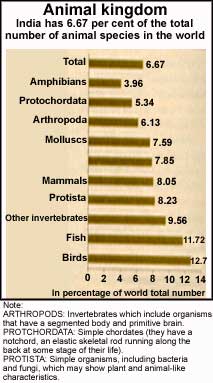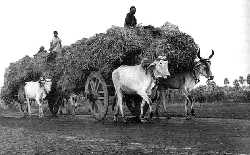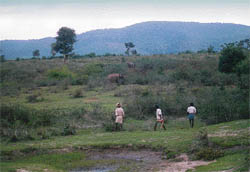
Sowing less, reaping bare
Yet another controversial move by our environment and forests ministry could ring the death knell for India's biodiversity

Yet another controversial move by our environment and forests ministry could ring the death knell for India's biodiversity

Misguided conservation efforts are leading to depletion of biodiversity and exploitation of poor people

The insurance market can become an invaluable weapon to protect the environment against errant industrial units

India's chief ministers are beginning to take note of environmental problems. But just about. The Centre for Science and Environment conducted a survey of <i>Down To Earth</i> readers and India's environmentalists. A report on the nature of the work carri

Ritual offering, survival food, index of sophistication: what s pagan about northeast India s penchant for wild meat?

Village Chipri in Kolhapur, Maharashtra is fighting: diseases, a factory and lax authorities
<p>Grid-connected solar power is growing fast in India, going from just a few megawatt (MW) in 2009 to over 1000 MW by mid-2012. 1000 MW of solar power can supply over 20 lakh Indians with electricity.

THE 1990-91 edition of World Resources, brought out by the Washington-based World Resources Institute (WRI), concluded developing countries as a group contribute to nearly half of the global warming problem. This was an astonishing finding, given that it

Merely providing schools is not enough to educate the more than 197.34 million illiterate women in India. Far too often, girls have to drop out of school to help their overworked mothers. But female literacy is crucial to a nation"s development and ensuri
"ECONOMICS is the science of studying people's behaviour in their ordinary day-to-day life." That is how undergraduate textbooks define the subject. The book under review, however, talks about an

Despite having the potential to give a green edge to the agricultural market, biopesticides are yet to make a mark in the agro sector. To create a market for biopesticides, there has to be a paradigm shift in the way business is done. It must develop a re

Premature deaths and disease caused by a polluted environment is the most pressing problem in the world today, says a WHO report prepared for the Earth Summit

The Blue Lady touched Indian shores in the first week of July. The 38,000-tonne ocean-liner's year-long search for a breaking yard has been dogged with controversies, with groups such as the Ban

The recycling option has once again shown that wastes like bagasse and wheat straw can be profitably used to generate energy, which could in all probability, ease the continuing energy shortage

Large scale habitat loss and massive encroachment of the forestland have escalated the instances of wildlife human conflict in recent times

The glitz at UNCED was very impressive over 100 heads of government gathered together to thrash out environment politics. But the results were disappointing

Biotech companies and the World Trade Organisation took centrestage at the fourth conference on biological diversity, leaving traditional communities to fend for themselves

Renovating traditiona_1 village reservoirs, farmers in Tamil Nadu are pursuing a green dream
A noted Gandhian historian, DHARAMPAL has enquired into variousfacets of M British Indian society. He has authored several books, including Indian Science and Technology in the 18th century and The Beautiful Tree. In a conversation with MAX MARTIN in

Volcanic activity in the Zambales range, of which Mount Pinatubo is a part, started 7 million years ago and Pinatubo itself has been active for 1.1 million years. Pinatubo last erupted about 400 years ago.